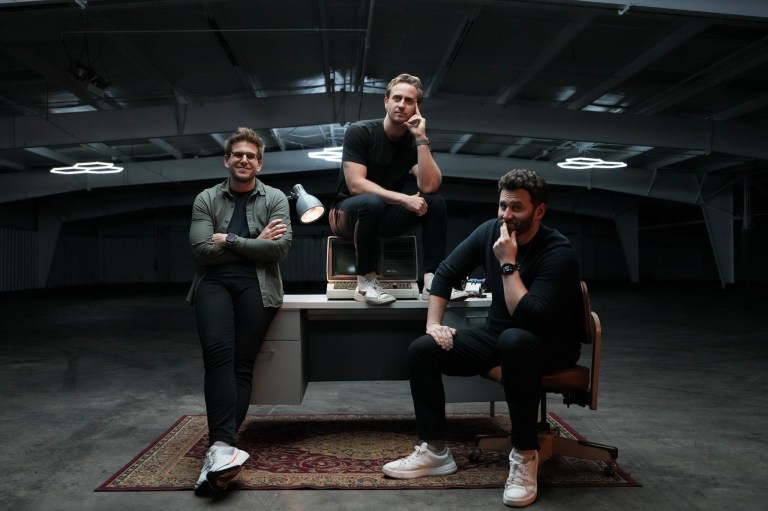A look into Birmingham’s game developer community: key players, projects + how to get involved
Reading time: 7 minutes

You know Birmingham’s food scene, and tech scene, and bar scene. One group you may not know? Game developers. These innovative individuals are pushing our Magic City forward in more ways than one. I caught up with six of them to get a look behind the screen—here’s what I learned, plus how you can get involved.
Six Key Players to Know in Birmingham’s Game Developer Community
We talked to six key players involved in Birmingham’s game developer community. These folks are impressive and their work is diverse. From publishing chart-topping games to developing devices on board SpaceX’s latest flight, no two players are alike. They include:
- Scott Wehby, Android Developer for Help Lightning
- Latt Vines, Infinite Black
- Fredric Dorothy, Software Engineer + Indie Game Developer
- Corey Shum, Director of Immersive Experience Laboratories LLC
- Mike Brascome, Programmer at UAB
- Andrew Stone, Co-Founder and CEO of Random Logic Games
Here’s what I learned from them:
1. Birmingham’s game developer community is small but active

You wouldn’t know from a quick Google search, but there is a growing group of game developers in Birmingham. Made up of artists, software engineers, musicians and more, the group acts as a collaborative space where members can share resources and help each other out with different projects.
“Birmingham’s game developer community is sparse but passionate and made up of talented, multi-disciplinary people. We’re not just coders. We’ve also had musicians and artists involved.”
Latt Vines, Infinite Black
Many members have other primary sources of income and pursue game development as a hobby. But the group is tight-knit. They even host monthly meetups—now virtual due to COVID-19. At a typical meeting, a member might present on something they recently learned, usually followed by a show-and-tell session for other members to share projects they’ve worked on in the previous month.
As for any gaming publishers in the city, we only found one—Random Logic Games.
Founded in 2013 by UAB graduates, Andrew Stone and Nick Sloan, Random Logic Games is a mobile gaming publisher that builds primarily word and puzzle games.
Over the years, they’ve seen a good bit of success—racking up tens of millions of installs. A number of their games have been chart-topping hits. Ever played “Guess the Emoji” or “Infinite Word Search”? Those were Random Logic games!
“We more or less used what little money ($5000) we had to hire a remote developer to build simple apps and games. As time passed, we got better and better until finally, things popped off.”
Andrew Stone, Co-founder and CEO of Random Logic Games
Now, Random Logic employs a small team and is continuously growing. Check out their site to learn more about them and explore more games they’ve created.
2. Game developing in Birmingham isn’t all fun and games

I’ll admit, when I started my research for this story, I had a preconceived idea of what game development was. My mind immediately went to popular mobile and video games like Angry Birds or Fortnite. And although there are some developers in Birmingham working in a similar realm to these types of games, there’s another side to game development here—a “serious” approach that involves developing games for educational purposes.
The work done at Immersive Experience Laboratories LLC, a small company based out of Innovation Depot, often falls under the “serious game” category.
Director Corey Shum shared a bit about how their work differs from typical game development:
“Using many of the same technical and methodological foundations as game development, we seek to engage participants in immersive experiences. But rather than having entertainment or artistic expression as a primary goal, we seek to teach, train, improve, and heal.”
Corey Shum, Director of Immersive Experience Laboratories LLC
They are currently working with UAB, VCU (Virginia Commonwealth University), UTMB (University of Texas Medical Branch), and UNSW (University of New South Wales, Sydney) on several funded projects including:
- COVID-19 PPE Virtual Reality training: safe repeated experiential training without using valuable PPE supplies
- Management of neuropathic pain in para- and tetraplegic participants with advanced Virtual Reality first-person avatar presentation and feedback.
- Medical resident situational decision training
- SUD RPG: A role-playing game to teach about substance use disorder and build empathy for those suffering from it
- Brain Injury and Stroke VR rehabilitation tools

We also spoke to Mike Brascome, a Birmingham native and programmer at UAB. After graduating from UAB with a degree in computer science, he worked at UAB’s School of Public Health and School of Engineering writing software and VR training apps for each respectively. He then moved to his current role in UAB’s Engineering and Innovative Technology Development Division in the School of Engineering.
There, he’s worked on some pretty amazing projects like building freezers for experiments on the International Space Station as well as writing applications to allow their team to control devices on the ISS from UAB’s Flight Operations Center. They even had a couple of their devices onboard SpaceX’s most recent flight!
Although Brascome doesn’t write games in his professional career, he says he owes a great deal of his success to game development.
“It’s what drove me to learn software development. It’s also what drove me to do well in math. When I was in high school, I was horrible at math. I saw no practical use for it at all. Then, when I got into game development, I learned that a good understanding of math was essential.
I wanted to build immersive, 3D environments. That required a good working knowledge of trig and linear algebra. Adding physics into the mix required learning calculus. It turned out that the math I had to learn to build 3D games was very similar to the math required to build machine learning models.”
3. There’s a great deal of untapped potential with game development in Birmingham

Like many other cities around the world, Birmingham’s tech scene is expanding. With organizations like Innovation Depot and Tech Birmingham attracting tech talent and entrepreneurs to the city, Birmingham has evolved into a growing tech hub. And for those involved in Birmingham’s game developer community, this evolution has been encouraging.
“It has been exciting to see Birmingham cultivate a tech scene and I really hope to see that continue. There’s an outdated reputation in Alabama among its techies that Birmingham has tech jobs related to banking and Huntsville has the contract work connected to the Redstone arsenal and those are your two options for work.
I think that isn’t as true in recent years. Birmingham is really starting to diversify and there are a lot of cool startups cropping up doing really innovative work.”
Latt Vines, Developer at Infinite Black
And with an expanding tech scene comes more growth opportunities for game development.
“Birmingham has just enough people for everyone in tech to kind of know each other. If you’ve got enough passion and drive, you reach out to the community and get something powerful started.”
Scott Wehby, Android Developer for Help Lightning
Interested in joining Birmingham’s community of game developers? Here’s how to get involved:
- Join the Game Dev Slack Group or Facebook Group
- More curious about all things tech in Birmingham? Join the Magic City Tech Slack channel to stay up to date on events and tech news.
- Participate in Vulcan Jam, a virtual event like a hackathon to create a game in a short timespan themed around the mythology of roman god Vulcan. It starts on August 23rd, and you can get more info here.





